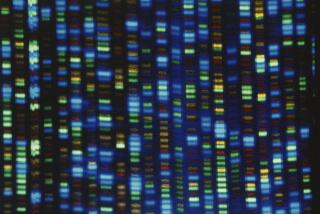Apple’s medical research app raises hopes, questions
- Share via
A new toolkit announced by Apple on Monday would allow medical researchers to tap into an expanding universe of iPhone users to recruit and enroll study participants, collect data and monitor health outcomes that are the object of research.
Apple on Monday made publicly available five new apps built by Apple and various university researchers using the toolkit. The company said it would release the open-access software for the toolkit next month, so other researchers could tailor apps to their needs.
Researchers studying asthma, Parkinson’s disease, diabetes, cardiovascular disease and breast cancer will be the first to use the new apps to conduct studies.
Most of the research being launched with the new applications appears to allow participants and researchers to track the daily lives and functioning of subjects and detect patterns that might lead to better disease-management practices.
One of the apps will be used as a part of an observational study that collects data from Parkinson’s patients in an effort to more fully understand the disease and how it affects daily life. Parkinson’s patients who download the app will be able to use the iPhone’s GPS and accelerometer to provide data on dexterity, balance, gait, voice strength and memory several times a day.
Another app released Monday -- called “Share the Journey: Mind, Body and Wellness after Breast Cancer” -- will let breast cancer survivors track and report fatigue, cognitive difficulties, sleep disturbances, mood changes and reduction in exercise performance in the wake of treatment.
A third app released Monday will be the centerpiece of a large-scale asthma study conducted by researchers at the Icahn School of Medicine at Mount Sinai. The study will aim to track symptom patterns in subjects and identify potential triggers for asthma exacerbation.
“The Asthma Health app is designed to facilitate asthma patient education and self-monitoring, promote positive behavioral changes, and reinforce adherence to treatment plans according to current asthma guidelines,” said a statement issued Monday by Mt. Sinai Health System.
Monday’s announcement was greeted with enthusiasm, and some questions, by biomedical researchers.
Dr. Pamela Tenaerts, executive director of the Clinical Trials Transformation Initiative, said the broader use of wireless technology in research would allow investigators to “cast their nets more broadly” to recruit study participants.
“Hopefully we’ll get more people involved in trials, better data and more answers for diseases,” said Tenaerts, whose organization -- a partnership between Duke University and the Food and Drug Administration -- aims to improve the quality and efficiency of clinical trials.
At the same time, said Tenaerts, “this would all have to happen with the same rigor as current clinical trials. Obviously, no one wants to lower the bar.”
Some experts questioned whether such apps would be sufficient for carrying out the kinds of rigorous clinical trials that are the gold standard of biomedical research. When iPhone apps are used to conduct such studies, enrollees would likely be expected to give “informed consent,” provide personal data and to report “adverse events” -- possibly without ever having met with study investigators.
Terri Hinkley, interim executive director of the Assn. of Clinical Research Professionals, said problems are sure to arise.
Hinkley noted, for instance, that most wireless device users routinely click the “I Agree” option without reading the fine print of user agreements.
“I would just shudder to think that informed consent would be collected that way, because I don’t think anybody would say that passes muster,” said Hinkley.
Hinkley added that study subjects who have had no contact with investigators might not recognize or report side effects or “adverse events” while participating in a trial. Where there is no reciprocal exchange of information between researcher and subject, such problems may be overlooked or underreported, she cautioned.
Follow me on Twitter @LATMelissaHealy and “like” Los Angeles Times Science & Health on Facebook.







